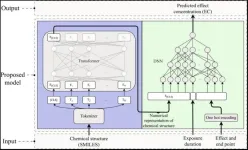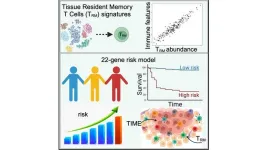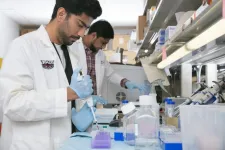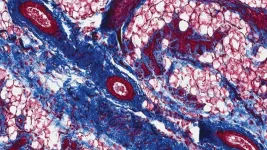(Press-News.org) The shareholders' meeting of the WZB has appointed Nicola Fuchs-Schündeln as the institute's future president. She succeeds Jutta Allmendinger, who has headed the institute since 2007. Nicola Fuchs-Schündeln is Professor of Macroeconomics and Development at Goethe University Frankfurt. The handover of office will take place on September 4, 2024 at the WZB.
Nicola Fuchs-Schündeln is a nationally and internationally renowned scientist who returned to Germany in 2009 after several years at Yale and Harvard. Since then, she has been awarded several prestigious prizes, including the Leibniz Prize of the German Research Foundation and prizes from the European Research Council. In 2019/20, she was Chair of the Verein für Socialpolitik, the largest economics association in the German-speaking world, and since 2021 she has been Program Director at the Centre for Economic Policy Research, a renowned network of European economists.
Her research topics are broadly based in the social sciences and she has extensive experience in interdisciplinary collaboration. Nicola Fuchs-Schündeln conducts research on the topics of inequality, social mobility and growth. She focuses on the question of how institutions and people's experiences influence their behavior and decisions. This includes work on the consequences of German reunification, the differences between the European and US labor markets, as well as the effects of joint taxation on the employment decisions of men and women.
Since 2007, the WZB has been headed by Jutta Allmendinger, who will step down as President on September 1, 2024 after three terms in office. Together with Nicola Fuchs-Schündeln, she will prepare the regular evaluation of the institute by the Leibniz Association in March 2025, continue to accompany BR50, the network of non-university institutes in the Berlin area, as its spokesperson until the end of the 2026 term of office and continue her scientific and science policy projects as emerita.
"With Nicola Fuchs-Schündeln, we have gained an excellent scientist for the WZB who will further strengthen the institute's outstanding research achievements across the entire breadth of the social sciences. Her international experience and networking will benefit the WZB's cooperation with partners in research and society," said Jochen Zachgo, Chairman of the WZB's Shareholders and Board of Trustees, welcoming the decision for the future president.
Jutta Koch-Unterseher, Deputy Chair of the Board of Trustees, said on behalf of the State of Berlin: "Nicola Fuchs-Schündeln will enrich Berlin as a science location with her comprehensive professional expertise, her international relations and her experience in policy consulting. Her research topics are broadly based and offer numerous starting points for cooperation at the WZB and with other Berlin research institutions."
Nicola Fuchs-Schündeln comments on the appointment: "The WZB is known for its outstanding research on topics of great social relevance. I will continue and expand this focus. What is particularly appealing to me is that the WZB is a large social science institute that combines economics with sociology, political science and law. The major problems of our time are complex – their analyses and solutions require cooperation between the various disciplines represented at the WZB. The collaborations that Berlin has to offer are also helpful in this regard, and I intend to continue and expand them. I am looking forward to the new task and to further developing the institute's profile."
About Nicola Fuchs-Schündeln
Nicola Fuchs-Schündeln has been Professor of Macroeconomics and Development at Goethe University since 2009. Prior to joining Goethe University, she was an Assistant Professor at Harvard University for five years. She received her PhD in economics from Yale University in 2004 and an honorary doctorate from Otto von Guericke University Magdeburg in 2023.
Nicola Fuchs-Schündeln is program director of the macroeconomics and growth program at the Centre for Economic Policy Research (CEPR), an elected fellow of the renowned international Econometric Society and a member of the German National Academy of Sciences Leopoldina. She received the Gottfried Wilhelm Leibniz Prize of the German Research Foundation (DFG), the most important research funding award in Germany, in 2018 and the Hermann Heinrich Gossen Prize of the Verein für Socialpolitik in 2016. She has twice been awarded funding from the European Research Council (ERC) for outstanding researchers, in 2018 with an ERC Consolidator Grant and in 2010 with an ERC Starting Grant. She is a member of the Scientific Advisory Boards of the German Federal Ministry for Economic Affairs and Climate Action and the German Central Bank as well as a research professor at the European Central Bank (ECB).
You can find her website here: https://fuchsschuendeln.com
About the WZB Berlin Social Science Center
The WZB Berlin Social Science Center investigates fundamental social issues. It conducts interdisciplinary research into development trends, adaptation problems and opportunities for innovation in modern societies. The main focus is on the problem-solving capacities of social and state institutions, from the local to the global level. A total of 470 people work at the WZB, including 200 German and international researchers and about 115 student assistants. The researchers conduct problem-oriented research in the disciplines of sociology, political science, economics, law and beyond. The WZB was founded in 1969 on the initiative of members of the Bundestag from the CDU/CSU and SPD. It is a member of the Leibniz Association. It is funded by the federal government (75 percent) and the state of Berlin (25 percent).
END
Nicola Fuchs-Schündeln to become the new President of the WZB Berlin Social Science Center
Successor to Jutta Allmendinger takes office on September 1, 2024
2024-05-02
ELSE PRESS RELEASES FROM THIS DATE:
Toxic chemicals can be detected with new AI method
2024-05-02
Swedish researchers at Chalmers University of Technology and the University of Gothenburg have developed an AI method that improves the identification of toxic chemicals – based solely on knowledge of the molecular structure. The method can contribute to better control and understanding of the ever-growing number of chemicals used in society, and can also help reduce the amount of animal tests.
The use of chemicals in society is extensive, and they occur in everything from household products to industrial processes. Many chemicals reach our waterways and ecosystems, where they may cause negative effects on humans and other ...
The people who are most active on social media are also the most active offline
2024-05-02
Parents often worry about the use of social media among children and young people. Caring about this is a good thing, and there are several reasons why you should pay attention, but there is one thing that parents needn’t worry about: young people spending time on social media does not impair their interaction with friends offline, according to a new study.
“On the contrary, we find that people who use social media a lot spend more time with friends offline,” says Professor Silje Steinsbekk at the Norwegian University of Science and Technology (NTNU’s) Department of Psychology.
The results are ...
Climate is one culprit in spread and growth of dust in Middle East
2024-05-02
Climate change is transforming dust storms—a natural phenomenon in the Middle East—into a more frequent and widespread threat to health and economies throughout the region, a new study shows.
Dust levels have increased in many parts of the Middle East chiefly due to global warming, but other human activities also share credit, says Zahra Kalantari, associate professor at KTH Royal Institute of Technology. She cites such factors as oil extraction, military conflicts and lack of cross-border ...
Gene signatures from tissue-resident T cells as a predictive tool for melanoma patients
2024-05-02
(LOS ANGELES) – May 2, 2024 - An extensive analytical study conducted at the Terasaki Institute for Biomedical Innovation (TIBI) has revealed an association between favorable survival outcomes for melanoma patients and the presence of higher populations of tissue-resident memory T cells (TRM). Data obtained from this study could be used not only for a TRM-based machine learning model with predictive powers for melanoma prognosis but could also elucidate the role TRM cells can play in the tumor immune microenvironment. This could guide the development of more effective and personalized anti-tumor immunotherapeutic treatment regimens for cancer ...
FAU creates new Department of Biomedical Engineering
2024-05-02
In recognition of a rapidly growing field, Florida Atlantic University’s College of Engineering and Computer Science (COECS) has created a Department of Biomedical Engineering. The newly established department will focus on three key areas: biomaterials and tissue engineering; smart health systems; and bio-robotics. Biomedical engineering integrates fundamental and practical concepts in electrical and mechanical engineering, biology, computer science and medicine into a cross-disciplinary field focused on improving human health and solving problems in the delivery of health care.
The COECS faculty are already performing ...
Program announced for NUTRITION 2024 to be held June 29–July 2
2024-05-02
Reporters are invited to join leading nutrition researchers and professionals at NUTRITION 2024, the annual flagship meeting of the American Society for Nutrition. The meeting will bring together thousands of experts from around the globe to share and discuss emerging scientific and policy developments in food, nutrition and public health June 29–July 2 in Chicago.
The meeting program features exciting scientific symposia, award lectures, networking events and more, offering an up-close view into the latest findings, opportunities and debates. More than 1,600 original research studies will be presented ...
A link between breast changes and … UTIs?
2024-05-02
Women’s health is often talked about in terms of major, life-altering events like pregnancy and menopause. A new study from Cold Spring Harbor Laboratory (CSHL) underscores the importance of considering everyday occurrences’ impact on women’s well-being.
CSHL researchers have made a surprising discovery involving urinary tract infections (UTIs). The scientists found that UTIs in mice can provoke a bodily response that results in structural changes in breast tissue. Remarkably, these changes are reversible ...
Researchers create new chemical compound to solve 120-year-old problem
2024-05-02
MINNEAPOLIS/ST. PAUL (05/02/2024) — For the first time, chemists in the University of Minnesota Twin Cities College of Science and Engineering have created a highly reactive chemical compound that has eluded scientists for more than 120 years. The discovery could lead to new drug treatments, safer agricultural products, and better electronics.
For decades, researchers have been investigating molecules called N-heteroarenes, which are ring-shaped chemical compounds that contain one or more nitrogen atoms. Bio-active molecules having a N-heteroarene core are widely ...
Four state-of-the-art, artificial intelligence search engines for histopathology images may not be ready for clinical use
2024-05-02
Four proposed state-of-the art image search engines for automating search and retrieval of digital histopathology slides were found to be of inadequate performance for routine clinical care, new research suggests.
The performance of the artificial intelligence algorithms to power the histopathology image databases was worse than expected, with some having less than 50% accuracy, which is not suitable for clinical practice, said Dr. Helen Shang, a third-year internal medicine resident and incoming hematology-oncology fellow at the David Geffen School ...
Young adults reduced drinking during and after pandemic
2024-05-02
A new study examined the drinking levels and patterns of young adults before, during and after the pandemic. The researchers found alcohol use and alcohol-related problems substantially decreased in heavy-drinking young adults during the pandemic, and these decreases were still evident as the pandemic began to wane. The results are available in the May 2 issue of the journal Nature Mental Health.
“The pandemic gave us a unique opportunity to see how wide-spread mitigation measures like social distancing and bar/restaurant closures may have affected alcohol consumption,” said lead ...
LAST 30 PRESS RELEASES:
PhD student maps mysterious upper atmosphere of Uranus for the first time
Idaho National Laboratory to accelerate nuclear energy deployment with NVIDIA AI through the Genesis Mission
Blood test could help guide treatment decisions in germ cell tumors
New ‘scimitar-crested’ Spinosaurus species discovered in the central Sahara
“Cyborg” pancreatic organoids can monitor the maturation of islet cells
Technique to extract concepts from AI models can help steer and monitor model outputs
Study clarifies the cancer genome in domestic cats
Crested Spinosaurus fossil was aquatic, but lived 1,000 kilometers from the Tethys Sea
MULTI-evolve: Rapid evolution of complex multi-mutant proteins
A new method to steer AI output uncovers vulnerabilities and potential improvements
Why some objects in space look like snowmen
Flickering glacial climate may have shaped early human evolution
First AHA/ACC acute pulmonary embolism guideline: prompt diagnosis and treatment are key
Could “cyborg” transplants replace pancreatic tissue damaged by diabetes?
Hearing a molecule’s solo performance
Justice after trauma? Race, red tape keep sexual assault victims from compensation
Columbia researchers awarded ARPA-H funding to speed diagnosis of lymphatic disorders
James R. Downing, MD, to step down as president and CEO of St. Jude Children’s Research Hospital in late 2026
A remote-controlled CAR-T for safer immunotherapy
UT College of Veterinary Medicine dean elected Fellow of the American Academy of Microbiology
AERA selects 34 exemplary scholars as 2026 Fellows
Similar kinases play distinct roles in the brain
New research takes first step toward advance warnings of space weather
Scientists unlock a massive new ‘color palette’ for biomedical research by synthesizing non-natural amino acids
Brain cells drive endurance gains after exercise
Same-day hospital discharge is safe in selected patients after TAVI
Why do people living at high altitudes have better glucose control? The answer was in plain sight
Red blood cells soak up sugar at high altitude, protecting against diabetes
A new electrolyte points to stronger, safer batteries
Environment: Atmospheric pollution directly linked to rocket re-entry
[Press-News.org] Nicola Fuchs-Schündeln to become the new President of the WZB Berlin Social Science CenterSuccessor to Jutta Allmendinger takes office on September 1, 2024





